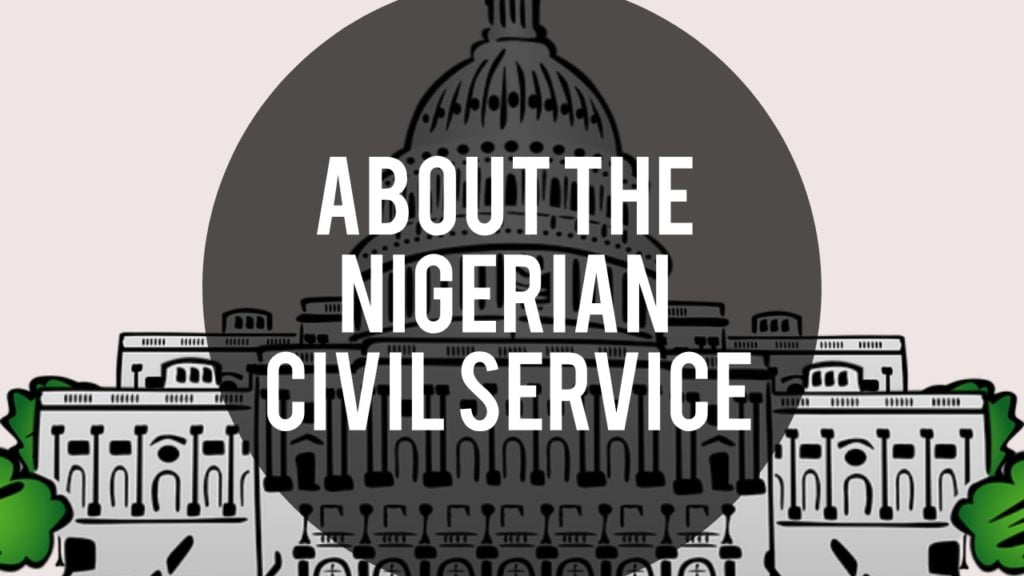Nigerian Civil Service: Structure, Functions and Problems: The Nigerian Civil Service is the body responsible for the implementation of the policies and programmes of government. Basically, the civil service performs mainly administrative and executive functions which involve the formulation and implementation of government policies and programmes.
It is pertinent to also note that the Civil Service is broken into different dapartments; each is called a ministry and is headed by a minister at the federal level, and by a commissioner at the state level, each of who serves as the political and executive head of the ministry.
Apparently, members of the armed forces, police, other security agencies, corporations and public agencies owned by government are not strictly under the various civil service commissions. However, they are in the public service and are called public servant. Like members of the Civil Service, they are all public officers.

In Nigeria, both the Federal and State government has a civil service. The civil service is usually stable and remains in place not minding which government is in power. The administrative head of a ministry is the permanent secretary, who is also called Director General. He is next to the Ministry or Commissioner as the case may be.
Characteristic of the Nigerian Civil Service
All over the world, the attributes of the Civil Service in a country includes:
- Permanence or job security
- Political neutrality
- Loyalty or impartial service to any government in power
- Anonymity or press shyness.
It is worthwhile to note that the head of the military such as the minister, commissioner, permanent secretary are answerable for the actions of the ministry and together with the public relations department are expected to speak to the press, unless otherwise directed. Usually recruitment is based on merit and expertise and efficiency is the watchword in the discharge of its duties.
MUST READ:
- Stages of passing a bill into law in Nigeria
- List of political parties in Nigeria and their abbreviations
- See the law report publications available in Nigeria today
- Best commercial courses to study in Nigeria
Structure of the civil service of Nigeria
Staff in the Nigerian civil service may be broadly classified as:
1. Executive class: This consist of the staff charged with the day to day execution or implementation of government policies and programmes. They are at the apex of the the structure of the Nigerian Civil Service. Sometimes, the officers of The Nigerian Civil Service at this level can actually punish junior officers to deter them from abstaining from performing their functions.
2. The professionals, technical or specialist class:
This is a very important class in the structure of the Nigerian Civil Service. People in this level includes; professionals such as lawyers, medical doctors, architects, engineers, accountants and so forth. They perform their functions based on their specific areas of specialty.

3. The clerical class:
These are staff of the Nigerian civil services that take care of critical issues of the body. Staff in this category includes: The secretary, clerks, typist and so forth. Obviously, this class of workers needs to have attained some particular level of education to be employed into the civil service.
4. Auxiliary class:
This is the class of worker that perform auxiliary jobs in the Nigerian civil services. This set of workers includes messengers, drivers and cleaners. It is pertinent to note that these works may have little or no formal education but are trained to perform various menial or auxiliary services.
Top 9 Functions of the Civil Service
Below are the functions and duties of the Civil service in Nigeria:
1. Policy formulation or implementation of government policies:
The basic function of the civil service of Nigeria is the formulation and implementation of government policies. This is a fundamental given to them by the law. Whenever the government is about to make policy on any issue that concerns the country, the Civil Service is the body responsible for formulating such policies.
Accordingly, the civil service is charged with the responsibility of implementation government policies. They ensure that the policies of the government are effective.

2. Advising the government: Another important function of the civil service is to advise the government before decisions on matters that affect the country are made. The reason for this is because, civil servants are more closer to the masses than the government itself.
So, whenever decision on matters that concerns the masses is deliberated on by the government, the civil service advices and make recommendations to the government on what will be for the best of citizens of the country.
3. Intermediary role between the government and the general public: Apparently, the Civil Service serves as an intermediary between the government and the general public. They help to bring the issue concerning the general public to the minds of the government so that the government will do something.
Just like I have explained, the Civil Service is actually closer to the general public than the government. Thus, they understand the pains and need of the masses very well. As an intermediary, the Civil Service usually advice the government on what the public needs and what the public does not need.
4. Making delegated legislation: One of the topics discussed so much on this blog is delegated legislation. As a body under the government, civil servant usually make delegated legislations on matters that concerns the country. This is apparently the reduce the workload of the government
5. Provision of social services and infrastructure facilities: It is pertinent to note that the body responsible for the provision of infrastructures at every level of government is the Civil service. Since they are given the legal power to execute government policies, the civil service also has performs the function of providing infrastructures. That is, the building of roads, hospitals, schools.
This function of the civil service is a very important because it help to generate businesses and employment opportunities for the the masses. For instance, if more schools are built and hospitals are built in a country, it apparently means that there will be more people working in the country.
6. Assisting the government In preparing budgets: Before budgets are assigned, the Civil can help in the drafting or reviewing of the budget before they are made public. More so, the Civil Service is the body can help in identifying the areas which the government is supposed to spend money on, and the areas where the government is supposed to spend less money on.
This will apparently help to ensure that there is no much budget deficit. Indeed, it is one of the essential functions of the Civil service in Nigeria.
7. Educating and enlightening the masses:
Another essential function of the Civil Service is to educate the public. The civil service has the duty to educate the general public on issues that concerns the public which the government is handling.
This is a very important fundament of the civil service because it is the only way to endure accountability and transparency in government activities.
8. Keeping of government records: Do you know that all the records of the government of every nation is usually keep for many purposes. Everything including; documents, enforcement of rules regulating various endeavors or sectors of life and of the country are keep by the civil service to ensure that the government is transparent and responsible when dealing with matters that concern citizens.
9. Assisting the ministry or commissioner: The Civil service is also charged with the responsibility of assisting a ministry or commissioner in meeting and responding to situations as he may direct, Performing other routine functions the Civil service is charged with and so forth.

Top 9 Problems of the Civil Service of Nigeria
The problems of the civil service of Nigeria are many. Some of the problems facing the Civil service currently includes:
1. Political instability: One of the major problems of the Civil Service of Nigeria is political instability. The civil service is always affected by the instability and crisis that plays in Nigerian politics because they are supposed to work effectively with every government.
One of the key features of the Nigerian civil service is political neutrality and anonymity. Nonetheless, whenever there is power tuzzel in politics, it still affect the Nigerian Civil Service because they work permanently with the government and as such, they are subordinate to the government in power.
This particular problem has contributed greatly to the reasons why the Nigerian civil service is vehemently criticized in the country.
2. Political interference: Another major problem of the Civil service is frequent interference by the government on the activity of the civil service and frequent change of ministerial heads, putting Square pegs in round holes and vise versa.
This is a big problem to the civil service of Nigeria because it when there is instability in Government, the civil service cannot be able to perform their functions properly.
3. Poor payment and conditions of service: You will agree with me that workers of the civil service of Nigeria are not paid properly. Officials under the civil service of Nigeria who are even paid very well may not be paid at all sometimes because of the usual embezzlement and misappropriation of public funds.
This is actually a big problem because when people are not paid very, they are not usually dedicated to their Job. In my opinion, the poor salary given to civil servants in Nigeria is one of the reasons why most servants are not dedicated.
4. Lack of qualified personnel: Evidently, the problem of lack of qualified personnel in the civil service of Nigeria is another problem that body is facing. Today, many unqualified people come into the Nigerian Civil Services without being properly scrutinized.
The reason for this is because of the high rate of tribalism, nepotism and favoritism during employment of workers in the civil service. More so, because of the lack of professionals in Nigeria, as a result of brain drain, most workers of the Nigerian civil service appear to be unqualified too.
5. Inadequate training: As you already know, the Civil service performs implementation function in Nigeria. They are responsible for implementating government policies. Apparently, some of these policies require some skill or knowledge to perform. This means that training is very important for the Civil service of Nigeria to be able to perform government policies the proper way.
6. Lack of dedication: Another problem of the Nigerian civil service is poor or negative attitude to work, laxity, lack of loyalty and deligence. Many a time I have heard civil servants saying “saying that governments job is no man’s job”. This is a very negative statement and it really affect the effectiveness of the civi service system of Nigeria.
I strongly believe, however, that the reason why civil servants are not dedicated to their job is because they lack good administration. That is, their activities are not properly checked by the right authorities. This is indeed a problem to the civil service of Nigeria that the government must stop to ensure the growth and development of the country.
7. Nepotism, tribalism, ethnicity or racism, fraud: Tribalism is not just a problem of the civil service. It is the problem of Nigeria as a whole. Tribalism is the cause of a lot of problems in Nigeria. For instance, political instability, poor road, examination malpractice, bad governance and even corruption in Nigeria are all as a result of Tribalism.
If you ask me, I think tribalism is one of the biggest problems we have in Nigeria. Believe it or not, if the problem of tribalism in the Nigerian civil service can be fought properly, then the effectiveness of the civil service is assured.
8. Corruption: Above all, corruption is the biggest problem of the Nigerian civil service. The rate of embezzlement of funds, bribery and misappropriation of revenue in government is one of the reasons why the Nigerian Civil Service don’t function properly.
Take for instance, where the funds that are supposed to be given to a civil service to perform a particular function is stolen by someone else, that particular function of the civil service will be left undone or done improperly. Corruption is a very big problem trust me.
9. Waste of manpower: Many Nigerian citizens argue that the civil service of Nigeria is useless because they mostly embezzle public funds or waste it on trivial things that will not really benefit the country or its citizens. This is true to some extent and it is actually a problem.
Imagine a country where there is waste of manpower and resources, excessive or undue reference to past precedence instead of flexibility. Undoubtedly, there will be no growth or development in government and economy.
MUST READ:
- Major differences between rigid and flexible constitution
- Differences Between Federalism and Unitary System of government
- Characteristic of fundamental human rights
5 Major Controls of Nigerian Civil Service
There are many ways through which the Nigerian civil service can be controlled to avoid the abuse and misuse of their powers. Some of the tentative ways of controlling the civil service includes:
1. Hierarchical control: Hierarchical control is one of the tentative ways of controlling the Civil Service of Nigeria. This type of control is based on the structure of the civil service. That is, control by the top officials of the Nigerian civil service. Take for instance, when the executive class of the Civil Service does anything to ensure that the Auxiliary Class perform their duties appropriately, this is referred to as a hierarchical control of the civil service. In a recap, it is the control based on the hierarchies control in the structure of the Nigerian civil service.
2. Ministerial controlp or control by the ministry: Of course! The ministers can actually control the Nigerian civil service. They can do this because they play important role in the administration of the civil service. So, when any officer in the civil service fails to perform his or her functions properly, the ministery may take action to ensure effectiveness and efficiency.
3. Legislative control: The Nigerian legislature can also control the Civil Service. This can be done through law making or invitation of top officials of the civi services for questioning and so forth. This is actually an indirect way of controlling the Civil service because it is these top officers in the Nigerian Civil Service that will come back and take actions that will control the activities of lower members of the civil service.
4. Judicial control: Judicial control of the Nigerian civil service is by the courts. In this case, the court may declare any act of the civil service wrong or against the law if it is satisfied the the powers given to the civil service has been abused or where the rights of Nigerians has been infringed upon.
5. Control by the civil service commission: This is the control by the civil service commission which has the power of appointment, promotion, discipline and so forth. The powers of the a civil service commission to regulate its members of staff includes the power of employment, promotion, transfer, discipline, retirement, and to otherwise sanction a staff.
However, termination and dismissal are very extreme measures that should be applied sparingly and most cautiously and so forth.
Must read:
- Offence of rape in Nigeria: Everything you need to know about rape
- Sources of Nigerian Law: See the main source of Nigerian Law
- Why indirect rule failed in Eastern Nigeria: See reasons
- Arms of government in Nigeria and their functions
- Is UNN 2024 departmental cut off out? See correct answers here
Conclusion:
It is evident, from what I have discussed so far, that the Nigerian Civil Service plays a major role in ensuring that there is transparency, accountability and credibility in the activities of the government. In fact, the Nigerian Civil Service is the mouthpiece of the citizens of Nigeria to the government. However, the civi service must function effectively to be able to achieve these goals. On that note, I enjoin the government and every citizen of Nigeria to do everything within their power to solve the problems of the civil service in any way they can.
This is where I am going to end in this particular article. If you have questions or contributions on this topic, do well to let me know using the comment section.

Edeh Samuel Chukwuemeka, ACMC, is a lawyer and a certified mediator/conciliator in Nigeria. He is also a developer with knowledge in various programming languages. Samuel is determined to leverage his skills in technology, SEO, and legal practice to revolutionize the legal profession worldwide by creating web and mobile applications that simplify legal research. Sam is also passionate about educating and providing valuable information to people.